DTG Recycle, which provides services for commercial, industrial, and construction clients, has employed a mix of technology and effective inspection practices to keep its fleet up and running.
Hauling thousands of tons of construction and demolition waste every day comes with unique equipment and maintenance challenges, noted Jake Petty, equipment manager at Seattle-based DTG Recycle. “Not the least of those is a high flat tire rate due to the job sites where we collect materials and our recovery facilities where materials are processed. One of our constant goals is to avoid tire failures and cut our tire budget.”
DTG Recycle, which provides integrated recycling services for commercial, industrial, and construction clients, is doing just that by employing a mix of technology and effective inspection practices. At its three maintenance facilities, all tire pressure and tread depths are checked daily, and mounted tires are on hand for quick changes.
“We’re also working with our Bridgestone dealer, GCR Tires & Service, to test a new tire pressure monitoring system on trucks and trailers that links with our Geotab telematics solution,” Petty related. “The system, which is connected through devices that replace the valve caps, measures pressure and sends us an alert when any tire is below 85 psi.”
DTG Recycle has also opted to lease 90% of its fleet. “We used to own our fleet, buying used and maintaining vehicles ourselves,” Petty said. “But with that came high maintenance costs and constant breakdowns, and that created problems with scheduling. If we couldn’t make a pickup, there was a domino effect that hurt our reputation with customers.”
Today, the bulk of the DTG Recycle fleet consists of Peterbilt models supplied by PacLease. In the operation are Model 220 cabover and Model 337 conventional truck; Model 579 tractors that pull walking-floor, end dump and gondola trailers; and Model 567 tractors on hook trucks and for hauling side-dump trailers.
“Leasing conserves capital so we can continue to expand our business, and we get new equipment that is exactly the way we want it,” Petty stated. “We go over specs continually. Recently, we changed the gear ratio in our tractors that cross Snoqualmie Pass to our newest location in Yakima, Washington. That not only helps speed the trip, but we’re also getting better fuel economy. On other trucks, we’ve bolstered the frame rails since we haul such heavy loads, and we adjusted wheelbases for better weight balance and to comply with bridge laws.
“Full-service maintenance is also the right choice for us because we have set routes, and uptime is very important in our operation,” Petty continued. “Each day, our drivers complete a DVIR [driver vehicle inspection report] through Geotab, and all repairs and maintenance needs are communicated to dedicated PacLease technicians who operate at our facilities from mobile service units.”
Although DTG Recycle outsources power unit service, it operates three shops, including a 50,000-sq.-ft. main facility, to service yellow iron units, dump and other bodies, and trailers, as well as a wide range of equipment. This includes Stellar Hook Lifts, boom grapple hooks, tarping systems, and all hydraulics. “We take care of everything from the PTO back,” Petty related. “In addition, we handle trailer repairs from reskinning to suspensions, brakes, and electrical systems. We have a team of welders and fabricators who also work on our more than 2,000 roll-off containers and over 100 trucks.”
An industry-wide challenge facing DTG Recycle, Petty noted, is finding technicians for the 15 staff at its main shop and six positions at its two satellite facilities. An in-house recruiter helps with that effort and works with local schools to recruit younger people, he said. Vendors and dealers provide training for all technicians at the fleet, and a company program is under development as well.
Founded in 1999 by owner Dan Guimont, DTG Recycle has grown exponentially nearly every year. The company has found success not just in hauling scrap material but also by finding ways to use it in innovative products, such as turning recovered gypsum into drywall waste blocks, and finding new uses for recycled plastic, such as an alternative fuel source for cement production.
“When we put scrap material to good use, it stays out of landfills and everyone wins,” Petty stated. “Backed by our fleet, DTG Recycle has found success.”
Source: https://www.fleetowner.com/
CUT COTS OF THE FLEET WITH OUR AUDIT PROGRAM
The audit is a key tool to know the overall status and provide the analysis, the assessment, the advice, the suggestions and the actions to take in order to cut costs and increase the efficiency and efficacy of the fleet. We propose the following fleet management audit.




